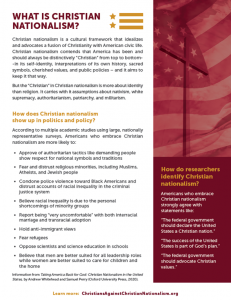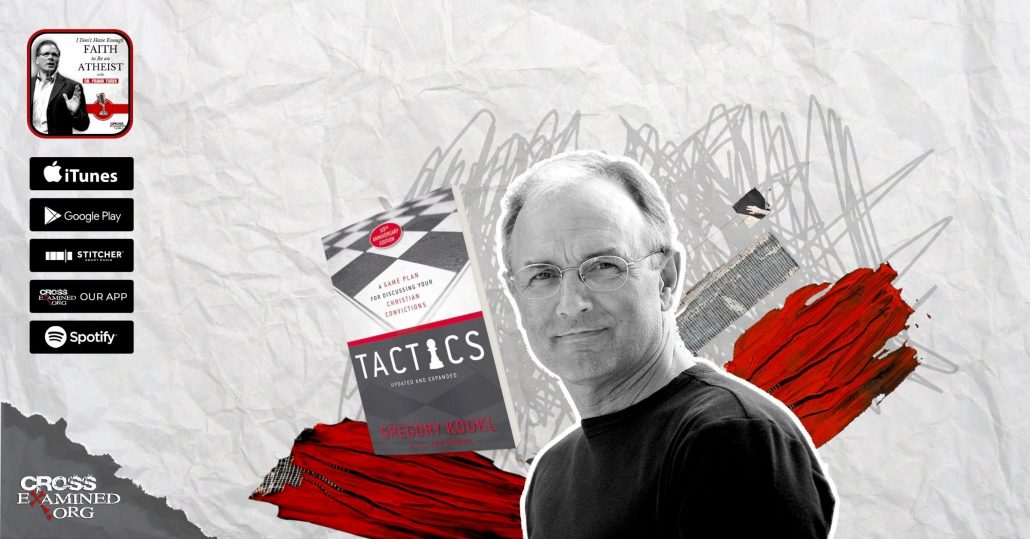Christians Shaming Christians Over Voting for Trump: 3 Strawman Arguments That Need to Stop
There’s been a sad fallout among Christians now that the election chaos has (mostly) come to an end and a new administration is taking over: Christians are shaming other Christians for having voted for Trump.
It’s one thing to say, “As a Christian, I didn’t support Trump because (fill in the blank with disagreements regarding his character or the party platform).” But it’s entirely another thing to mischaracterize why many Christians did vote for Trump and then attempt to make that into a shameful thing. Not only is that uncharitable between brothers and sisters in Christ, but it fuels the flames of the resentment non-believers have toward politically conservative Christians.
When a person mischaracterizes another’s position on something in order to attack it, that’s called a strawman fallacy. And there’s a lot of straw-manning going on right now.
Here are three big ones.
Strawman 1: If you voted for Trump, you did so because you want Christians to have political “power.”
Ed Stetzer, a dean and professor at Wheaton College, published an opinion piece in USA Today this week titled, “Evangelicals face a reckoning: Donald Trump and the future of our faith.” The subtitle is, “We must live up to our calling as evangelicals: to proclaim Jesus Christ to the world, rather than betray Him to sustain worldly power.”
The subtitle is simply puzzling—if a person voted for Trump, they weren’t living up to their calling as evangelicals because they were chasing after worldly power? This is a strawman, but to understand why, we need to understand what it means to be a secular country—and what it doesn’t.
The United States Constitution states, “Congress shall make no law respecting an establishment of religion, or prohibiting the free exercise thereof.” This so-called Establishment Clause of the First Amendment is what people commonly refer to as the principle of “separation of church and state” (though that term is nowhere in the Constitution). The Establishment Clause ensures that the government will not establish a state-supported church and will not force individuals to practice a particular religion. That’s a great thing! It’s freedom of religion. But that says nothing about how individuals should or shouldn’t use their religious beliefs to inform their participation in public life. Secular doesn’t mean we’re supposed to create some kind of neutral, value-free society and keep our worldviews to ourselves. That’s impossible. Every society necessarily makes judgments about what’s good and bad, and ultimately those are worldview questions.
Now, with that in mind, does that mean Christians want power when they vote a certain way? If by power, you mean that they want to advocate for the values that are consistent with their worldview, then the answer is yes, and that’s not a problem. That’s what one should expect to happen in a secular country, where the state isn’t enforcing the authority of a single religion. Everyone is free to vote according to their conscience. If Christians supposedly want “power” because they vote according to their worldview and values, then every single person voting could be accused of the same thing.
One has to wonder, then, what Stetzer has in mind when he cautions Christians not to “betray” Jesus to sustain worldly “power.” Whatever a person thinks of Trump personally, it should be obvious that many Christians (if not the vast majority) were not voting for him as some kind of godly individual, but rather for the platform he represents—particularly over and against the Democratic platform. To suggest that Christians who chose the Republican platform over the Democratic platform are somehow betraying Jesus by voting for someone in the interest of “power” is just outlandish. Conservative voters aren’t chasing power any more than liberal voters are. They’re just voting for the platform that best aligns with their values, even if the candidate representing that platform doesn’t always embody those values. (Does any candidate ever?)
Strawman 2: If you think your faith should inform your political views, you’re a “Christian Nationalist.”
This phrase (“Christian Nationalist”) is getting tossed around everywhere lately. According to an organization called “Christians Against Christian Nationalism,” the term refers to “a cultural framework that idealizes and advocates a fusion of Christianity with American civil life…it carries with it assumptions about nativism, white supremacy, authoritarianism, patriarchy, and militarism.” You can see an image from the organization below.

Let me just say I have literally never come across a Christian who would be considered a Christian Nationalist according to this description—and I follow a lot of online groups/social media communities with Christians all over the spectrum of belief. That’s not to say such people don’t exist (there are always extremists), but that they certainly don’t represent a large number of Christians.
Here’s the problem: People are slapping a strawman label of “Christian Nationalist” on anyone who voted for Trump. If a Christian Nationalist is someone who meets these criteria, then it’s ridiculous to say that all those voting conservative are “Nationalists.” However, I don’t think most people have a specific list such as this in mind when they use the term. They’re simply accusing Christians of mixing church and state because they voted for a platform according to their (Christian) values. To them, that’s “Christian Nationalism.” But, as I explained in the prior point, that shouldn’t even be seen as a problem! Again, it’s what’s expected in a secular country. We have freedom of religion—no state church—and can use that freedom to vote based on our conscience.
This point is closely related to the first point, but comes with a fancy label for extra shaming.
Strawman 3: If you’re concerned about the future of the country given the election results, you’re putting your faith in a person (Trump) rather than in Jesus.
I have seen numerous reminders on social media that we need to put our faith in Jesus, not a political savior. Sometimes these are meant as a simple encouragement, but a lot of times they come with the implication that those who are concerned about the direction of the country under Biden are putting their hope in politics instead of Jesus.
This is the ultimate strawman!
No one I know “worships” Trump or thinks that the President is some kind of replacement savior (not that that means such people don’t exist, but those who do certainly don’t represent the average Christian). People who voted for him may believe that his policies will place the country in a better direction than those of Biden, but that isn’t a confusion about where our hope comes from. When Christians talk about hope in a biblical sense, we’re talking about the hope of eternal life. We may additionally have political hopes for our country’s direction, based on our worldview, but these are completely different kinds of hope. A person can have the hope of eternal life, the hope of a certain direction of the country, and deep concern about an election outcome all at the same time.
Christians are on the receiving end of all kinds of mischaracterizations by non-believers. When we strawman each other, we only add to those misunderstandings. Moving forward isn’t about how we fix our “reputation” for having voted for Trump (as some Christians seem to be concerned about); non-believers will never like our values, no matter who we vote for. It’s about having nuanced and charitable conversations about the best way to live out our faith in the public square…while accurately understanding and responding to one another’s views. Strawmen are easy to blow down, but the damage is hard to fix.
Recommended resources related to the topic:
American Apocalypse MP3, and DVD by Frank Turek
Correct, NOT Politically Correct: How Same-Sex Marriage Hurts Everyone (Updated/Expanded) downloadable pdf, Book, DVD Set, Mp4 Download by Frank Turek
Economics, Environment, Political Culture CD by Kerby Anderson don’t promote
Government Ethics CD by Kerby Anderson don’t promote
The Case for Christian Activism MP3 Set, DVD Set, mp4 Download Set by Frank Turek
You Can’t NOT Legislate Morality mp3 by Frank Turek
Fearless Generation – Complete DVD Series, Complete mp4 Series (download) by Mike Adams, Frank Turek, and J. Warner Wallace
Natasha Crain is a blogger, author, and national speaker who is passionate about equipping Christian parents to raise their kids with an understanding of how to make a case for and defend their faith in an increasingly secular world. She is the author of two apologetics books for parents: Talking with Your Kids about God (2017) and Keeping Your Kids on God’s Side (2016). Natasha has an MBA in marketing and statistics from UCLA and a certificate in Christian apologetics from Biola University. A former marketing executive and adjunct professor, she lives in Southern California with her husband and three children.
Original Blog Source: https://cutt.ly/zjL9Odt



